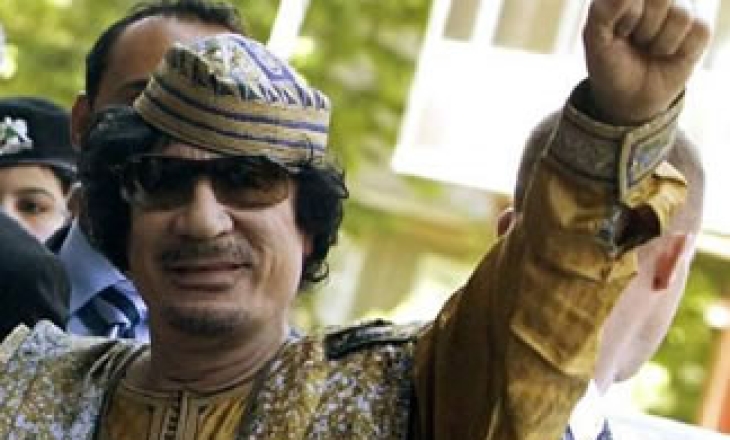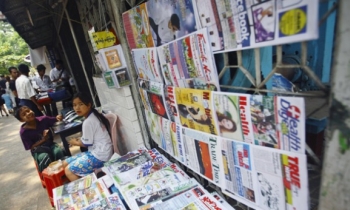A Moroccan court has imposed fines and damages on three independent dailies for "publicly harming" Libyan leader Muammar Qaddafi, above, and "injuring his dignity."
The Ain Essaba'a Misdemeanour Court in Casablanca ordered each of the three newspapers—Al-Massae, the country's leading daily, Al-Jarida Al-Oula and Al-Ahdath Al-Magrebia—to pay a fine of 100,000 dirhams (US$12,484) and damages of one million dirhams (US$125,213) to Qaddafi. The 100,000 dirham fine is the maximum amount allowed under Morocco's press law; damages are left to the judge's discretion.
Hassan Semlali, one of the defence lawyers, told the Committee to Protect Journalists (CPJ) that the newspapers expect to appeal the decision based on a "clear violation of the law." Ali Anouzla, editor of Al-Jarida Al-Oula, told CPJ that the court's decision was politically motivated. He said the ruling would not prevent him or his colleagues from "doing their job, as far as criticizing dictatorial regimes similar to the one in power in Colonel Qaddafi's Jamahiriya."
The case stems from critical articles published by the three independent dailies in 2008 and early 2009. Anouzla's November 18 opinion piece, headlined "We and the Arab Maghreb," criticised not only Qaddafi, who seized power in a military coup 40 years ago and is currently head of the African Union, but his autocratic counterparts in neighbouring Mauritania, Algeria, and Tunisia.
Proceedings began on May 18. In arguments made on June 22, defence lawyers said the complaint was not in accordance with Moroccan law, which bars media from harming the reputation of heads of state and foreign ministers. The defence noted that nowhere in official Libyan documents is Qaddafi referred to as head of state, only as "Guide of the Revolution." The court rejected the argument, prompting defence layers to leave the courtroom that day.
"We are dismayed that Morocco's judiciary has chosen to punish journalists who express views that do not conform to those of the political leadership," said Mohamed Abdel Dayem, Committee to Protect Journalists (CPJ) programme coordinator for the Middle East and North Africa. "This ruling should be overturned on appeal. The exorbitant amount in damages indicates that the courts are being used again to settle political scores with critical journalists and to put critical publications out of business."
Moroccan journalists told CPJ that Qaddafi's support of Morocco's claim of sovereignty over the disputed Western Sahara, Libyan investments in Morocco, and the presence of hundreds of thousands of Moroccan workers in Libya were among the issues that influenced today's court decision.
The Moroccan Association of Human rights concluded in its annual report released this month that the right to a fair trial was violated in all proceedings involving journalists in 2008. "The judiciary has been used by the state to settle scores with journalists, to seek revenge and terrorise citizens," the group said.
CPJ research concluded in May 2007 that Morocco was one of the world's worst backsliders on press freedom. That year, high-ranking Moroccan officials told a CPJ delegation that they were reforming the press law to ease the most onerous restrictions. To date, however, little progress has been made toward bringing the law in line with international standards for freedom of expression. Journalists continue to be judicially harassed, silenced, and assaulted.










